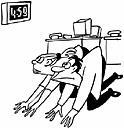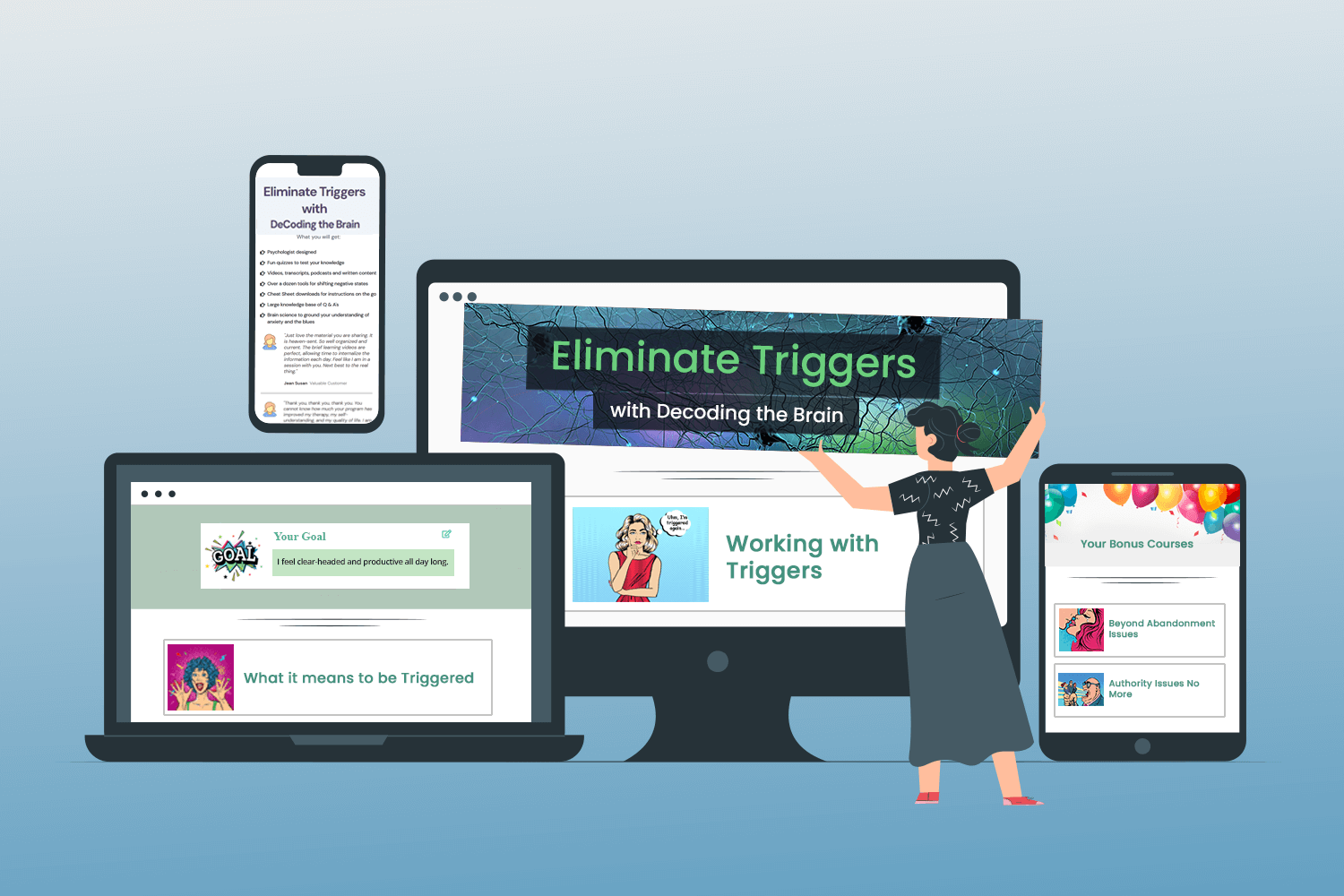You're proud as punch. You've landed a pretty good job in a responsible position.
Yeah, it'd be perfect - if it weren't for your boss.

Dr. Susan LaCombe, Psychologist and Psychotherapist.
Passionate crusader for nervous system health.
"To work through your triggers especially with "authority issues", begin by helping your autonomic nervous system to self-regulate."
You think you left home? Think again!![]()
Difficulty dealing with authority figures is a common reason people enter therapy, and it shows up in several characteristic ways.
- Some go from job to job because they can't handle a boss. This pattern is usually repeated in their dealings with others "in authority" (e.g. doctor, police officer, maitre'd).
- Some people unconsciously express their authority issues in sublter ways. For instance, they can be overly-deferential towards authority figures. They have a problem saying no, and are usually the ones staying late because they've taken on too much.
- Others reveal themselves in how they exercise their own authority in dealings with students, subordinates, and clients. If you've seen the show "The Office" you know what we mean.
Authority issues compromise our decisions in life
Our unconsciously-held attitudes towards authority are also revealed in our personal views of organizations and institutions. I've personally had to make an effort to overcome a prejudice against bureaucratic corporate culture.
On the plus side, however, the aversion I felt was a strong motivator in creating my own company and being my own boss.
In my case I left the corporate world completely, but my attitude towards authority still had to be addressed (in therapy) because it remained a liability to my success as an independent businesswoman.
In retrospect, I might never have had the energy I do now to do the things I want in my life if I hadn't gone to therapy and dealt with my own authority issues.1
How authority issues show up
If you have these issues, you'll find yourself responding in inappropriate ways to authorities. You may find yourself fluctuating between over-compliance and hostility. If you are a boss, you might realize how your use of authority replays the same drama you experienced as a child.
If you are a boss, you might realize how your use of authority replays the same drama you experienced as a child.
When we say we have issues with authority it means we have difficulty with individuals who wield power over us.
This could be our boss, but also someone with higher social status, or anyone who has something we want and the power to withhold it.
Psychologically speaking, authorities have only as much power over us as we reflexively give them. You see, it isn't the way we think about authority, though that's certainly part of it. The trouble lies in the way we feel about authority.
The power we allow an authority figure to have over us affects how we feel about ourselves, and thus the degree of internal discomfort. That being so, the ability to change our attitudes remains in our hands. We give away our power, or we exercise it, to the degree to which we resolve those issues.
That being so, the ability to change our attitudes remains in our hands. We give away our power, or we exercise it, to the degree to which we resolve those issues.
How do these issues arise?
Your first "authority figures" were your parents, or caretakers. That's right, it all goes back to Mom and Dad!

Blaming parents doesn't always server you well. Typically, they were passing on--quite unconsciously--pretty much what they experienced when they were that age.
Issues arise through the implicit memory system
Our feelings about authority are governed primarily by the implicit memory system. They emerged through interactions with our parents in the early years. It's where our feelings towards authorities are imprinted and hence why we respond the way we do.

If your mother or father (or caretakers) felt it was better to evoke fear to get you to obey them, then you probably have ambivalent feelings about authority.
Indeed, if they had ambivalent or conflicted feelings about authority figures, then almost certainly you picked up on them, albeit non-consciously.
In particular, if you experienced abuse at the hands of your parents/caretakers or anyone you trusted when you were very young, then you're much more likely to have authority issues
Indeed, if they had ambivalent or conflicted feelings about authority figures, then almost certainly you picked up on them, albeit non-consciously.
In particular, if you experienced abuse at the hands of your parents/caretakers or anyone you trusted when you were very young, then you're much more likely to have authority issues.
The implicit memory system is experienced not recalled
An implicit memory is automatically experienced - it isn't intentionally recalled. The feelings and reactions you have are the outgrowth and the culmination of many previous memories with authority figures.
Those previous memories get stored as implicit memories. So you won't recall the incidents - you're automatically recalling the feelings associated with these events and they are shaping your views of authority figures.
Changing your response to authority in therapy
Because authority issues arise from our feeling states, they're not effectively changed by left brain criticism or admonition. We need to feel how and where these states arise in the body (a right brain strategy) and then move into experiencing something new at that moment.
Where would we find such an experience?
One good place to start is in the safety of a therapeutic relationship--with an attuned therapist.

A good attuned therapist meets you exactly where you're at. Their nervous system resonates with yours and in doing so, helps to "contain" the charge you're feeling.
When you bring your attention to that process, new neuropathways are developed in the brain. When this process is repeated it has a reparative effect on the nervous system and you don't get so triggered.
Can you do this work on your own?
I believe so - I've certainly worked on my authority issues myself (there's a reason why I chose to write about this subject 🙂
Truthfully though, it does help if you know how to work with the nervous system and to work directly with triggers*.
Resolving issues related to authority doesn't mean you have to confront your past.
It's certainly an option and a choice you can make at any time.
However, it's often far more effective to deal with the past hurts first, on your own (or with a therapist/coach).

At that point, you're on more solid ground. You've worked through some of emotional underpinnings without being dependent on the original source of your pain to rescue you.
Then if you so choose so, it's much easier to deal with any unresolved issues that may be impacting your current relationship.
*This is a little self-serving - my online program Eliminate Triggers with DeCoding the Brain does just that. It involves improving your capacity to tolerate emotion (through nervous system work) and then giving yourself experiences your brain can learn from (using tools to address deep wounds). See ad at bottom of this page.
Reviewed by: Dr. Carole Gaato
Special Message from Dr. LaCombe

Let’s be realistic about what's entailed in changing the brain.
You’re reading an article that hopefully provides an explanation for an issue(s) you’re currently dealing with.
Many of my readers appreciate knowing that their issue was arrived at through no fault of their own.
However, please know that other than some temporary relief, information itself won’t actually make a big difference to your future behavior or how you feel about yourself.
It’s an illusion to think otherwise.
It’s not necessary to spend hours on yourself to change, it does however require consistency and a depth of feeling without which change will only be surface-level.
The brain doesn’t change overnight. It’s a process that involves both your mind and body. You may have tried many things in the past without including both aspects.
I truly believe change is possible for everyone - I’ve seen it for all types of people, all kinds of issues - I encourage you to give it another try.
related topic
Strengthening personal boundaries
myshrink presents
Reduce your over-reactivity to authority figures by optimizing and self-regulating your nervous system. It's a step-by-step process that begins by increasing your resiliency.
Then learn how to ground through the trigger charge and create new experiences for your brain to learn from.
Finally, sit back with the inner knowledge you can handle whatever your boss throws at you!
To learn more click the image below.
Eliminate Authority Issue Triggers at the Root
Click the image to learn more
Toxic Work Environmnent?
If you've been in a toxic work environment you'll find the posting below interesting. It's from a boss with an employee who appears to have issues with authorites.
Readers Comments

George
When is a strong reaction to authority appropriate?
I struggle with issues with authority, which I was reading about in this site. Very helpful, to everyone who described their experiences, and to Shrinklady's responses.
It seems difficult for me to differentiate between instances when I am overreacting to authority in a paranoid fashion, and when I am reacting to a situation where someone is trying to demean me, or others who I may try to stick up for.
I am certainly hypersensitive to authority, and reading about this has been helpful. The struggle, for me, is to understand when a reaction to authority is appropriate.

PT
Either overly compliant or overly defiant.
It is interesting that most of the comments I read were written by women ... and young(er) women at that. However, I am a 55 year old man with authority problems and they do happen to men. They may even happen to us more frequently, but we are less likely to seek help.
What I have found is that these problems have seemingly ebbed and flowed during my life - sometimes intense, sometimes not at all. But they were always there lurking in the background even if they were not causing problems at the time. I watched my father suffer with these problems most of his life -- to the point that he was almost psychotic at his death. Now I see my son going through the same problems just as I am dealing with them now. That makes me feel sad.
He is not aware of the issue but I hope he doesn't wait until he is 55 like me. One thing I have wondered though. You mention throughout that this is a feeling issue not a thinking issue. Yet, there seems to be two schools of thought. One says the feelings come from the "old brain" on which they are deeply imprinted. Those feelings then result in thoughts (ie, self-talk) and if we become aware of the self-talk we can use the "wise mind" to talk our way out. (For example, a thinking strategy might be, "is there rational objective evidence to support what I believe about this situation?")
Another school of thought says that the reactions are so deeply engrained we can't hope to change them cognitively. I.E., it isn't possible to "fake it til you make it." Traditional psycho-therapy is the only way. What do you think about this?
Can cognitive therapy work? Does it even help or is the traditional psychotherapy setting where you work through the issues of transference and counter-transference the only method that works?
When something comes up during the day I find myself using these cognitive strategies to cope. Sometimes they seem to work and sometime they don't. The more intense the problem the less they seem to work. I've been told that it is just a matter of practice, but I wonder if that is true. So, I continue to find myself either overly defiant or overly compliant. (No coincidence that these words rhyme.)
It is very difficult for me to set and keep boundaries without going through a bad time which reminds me I have to practice this daily. It is very difficult to get a handle on sometimes and can be very frustrating. I'm at one of those points now. I do see a counselor but how do I know if he is doing a good job? I think sometimes I intimidate most people and trigger their mal-adaptive strategies or authority issues ... maybe even my therapist. I don't want to arrive at the end my life a bitter, angry and unhappy old man.

Shrinklady
Hi PT, it's so inspiring to hear your reflections. It certainly appears that you've been doing some soulful thinking about your life. And you know, age 55 is a great time to start therapy. You'd be amazed at the folks I see who are making changes at this time of life. I'm in that camp myself.
So, to answer your question...yes, cognitive strategies work albeit not all the time. And the problem is, they take a long time to get them set into "procedure" for all your different states.
You see, these strategies are less effective if your state shifts too much from your baseline as we often do when we get stressed (i.e. if you get activated). That's why they work sometimes and not others.
Their effectiveness depends on how activated your nervous system is at the time. If you're maxed out by the day or the previous day's activities, then chances are you won't have room to contain the arousal pattern. If the activation is not contained, you will have less cognitive control.
In other words, your emotional brain will call the shots and your internal reaction will be there before you can say jack rabbit.
However - and this is really important - you don't need to go the route of traditional therapy either. I recommend right brain based therapies. In other words, get a right-brain-based therapy for a right-brain-based problem!
Right brain therapies involve an attuned connection with a therapist. Body psychotherapy and mindfulness based therapies might easily fall into that category.
These types of therapies most often create change from the "bottom up" (i.e. from the reptilian and emotional brain). Cognitions are certainly involved but not near the degree that "top down" strategies (aka cognitive or left brain strategies) entail.
Here's the thing PT and it relates to your current therapy.
Even therapists who use cognitive therapy exclusively have the capacity for co-creating deep "to the core" changes with their clients. If your therapist is attuned - he or she is able to help you track and contain your emotional states - then there exists the potential for long lasting change.
I have one suggestion PT. You ended your post with an interesting comment and it sounds as if you are picking up on some countertransference from your therapist. I wonder if it might be useful to share this insight with your counselor?
My guess is that it might prove a good jumping off point for deeper work. At the very least, you'd learn pretty quickly if your therapist is right for you.
Best wishes on your journey,
Shrinklady

Lisa
My boss uses fear to control us.
I have come to the point where I hate my boss. I think it's largely because some of his behaviors have triggered my difficulties with authority. He is rude to me, doesn't respect me as a senior employee ( will for example insist that I break a lunch date to do something I could do after lunch), recently threatened to fire me (when I tried to tell him a certain posting system wasn't adequate he told me I had a choice between learning to do it or leaving my job) and lately he told me that letting someone go was a good thing because it scared people into working harder.
I was so triggered that I can barely look at him without a glare of hated in my eyes.
My mom was extremely abusive and her whole way to discipline me was through fear.

Shrinklady
Oh my Lisa, it does seem like quite the challenge you have there. Holding onto your personal power will undoubtedly muster all the resources you have.
I like that you related your current experience with your history. Growing up with an abusive mother has likely sensitized you to the dynamics around the workplace.This awareness is critical to understanding the intensity of your reactions in this present situation.
It's important to understand that this man is likely triggering your early childhood experiences. This means your internal reactions will be intensified in ways that are probably different from your colleagues some of whom might be better at sloughing him off or finding a different way of dealing with him.
If my guess is right, you most likely will go into a familiar pattern, a freeze response. In this state, we usually find it hard to defend ourselves and left brain thinking is often off line.
This is really heavy duty stuff Lisa and I'd really encourage you to find a therapist who can help you find your way through these landmines.
In time, you may find that you're less impacted by him and/or even open to options not previously considered. Yup, you may even surprise yourself. That's the good news potential of working through our own stuff.
Best to you,
Shrinklady

Judy
My adult daughter still disrespect authority, including mine.
I am a single mom (widow) who has a daughter and a son. My daughter (older) has had what seems to be authority issues since childhood. After reading all of your above responses to others, I really think this is what my daughter's problem is. Great kid, loving heart, but she has had discipline issues since middle school.
Now it manifests itself into not being able to hold a job. If she is told NOT to do something she does it all the more... sort of like it's a game... "okay go ahead and see if you can catch me." Her grades dropped in school in classes she was challenged in.
Once it became a problem we, (her parents and teachers) tried to help with tutors, and punishment... ie: can't go to dance unless your grade comes up...grounded for behavior issues etc. It became more of us thinking of discipline than having a fun relationship. It seemed that the action was so important that the discipline didn't matter.
Now it has become an issue with college. Not going to class, completely failing classes even to the point of taking a couple semesters off. She has shoplifted and gotten caught, she smokes and has used Rx drugs that she has bought on the street. The thing is, she isn't very good at not having me find out. Almost appears as if she WANTS me to. Or knows I'll try. I don't know anymore. I think it could be a "mother/daughter issue sometimes.
My question is: could this be all my doing and can I change MY behavior to help her change hers?

Shrinklady
Hello Judy, yes it does seem that your daughter is wanting to attract your attention. The dynamic of "okay go ahead" feels like a working through of something in the hopes of getting what she needs. That might seem contrary on the surface of course. It's the nature of reenactments, they tend to get played out in several scenarios.
And yes, in situations like these, there are usually things you can change in your behavior to help her. I also want to say that it's wonderful you are approaching the problem from this perspective. It will require some personal work on your part and it's awesome that you are open to the option of looking at your own behavior. Nonetheless, the results will likely benefit the both of you in ways you may not anticipate at present.
Your daughter is bouncing up against you and it sounds as if the ways you have been reacting in the past are no longer working. I suspect there is something that she is needing from you and she may not even be aware of what it is. And, if she is aware, I suspect she won't take it seriously into conversation with you unless she feels emotionally safe to do so.
It might be useful to look at the situation from the perspective that her behavior in her youth was in the service of her needs. When a child is acting out as she did early in her middle schooling, her attachment to you would be the first thing to look at in my books. Maybe, her behavior was an outgrowth of misattunements that weren't apparent at the time. Perhaps, she was picking up on unresolved anger from you. There are numerous hypotheses to consider.
One thing's for certain Judy, it's gonna be hard to figure it out on your own. The best way to get to the bottom of possible issues is to engage in your own therapy. It's with a seasoned therapist that patterns in your relationship with your daughter can be uprooted and made apparent to you.
With the benefits of good therapy, you will learn to bring a level of honesty into your interactions with your daughter and to approach her with a deeper level of understanding and commitment.
I hope it works out for you,
Shrinklady

Rachael
Do I distrust authority, or just men?
How do you know you truly have issues with authority? I'm reading through some of this and the only thing that rings true is either I'm overly subservient to others or put up walls and give the silent treatment when I feel those people have hurt me - we're talking husband and pastors here.
I went through years of physical and sexual abuse as a child-although not from my parents-and so I'm wondering-is this really an issue with those in authority over me, or is it an issue with trust-especially in men?

Shrinklady
Well Rachael, it's quite probable that you are dealing with both. But here's the thing. The left brain sometimes gets so wrapped up in trying to figure out the "why" of something, especially since it has a superiority complex, when in fact, we need to be looking at what "just is".
In other words, it's not so much in finding an exact label for our angst as it is important to move through the feelings of it. The subservience that you notice and the silent walls you create are common survival strategies in reaction to abusive authorities. You see, any adult to a child is an authority figure. And, lack of trust in men when they have been the abusers, is a natural consequence.
Given your history Rachael, I can imagine that you're carrying a heavy load. I do hope you're getting the support through therapy. Issues of abuse run so deep, it's almost impossible for us to resolve them on our own.
Take care,
Shrinklady

Heather
Always break down in tears when stopped by a policeman.
Thanks for your website - not many resources came up when searching which surprised me. I was recently told that one of the reasons I had difficulty in graduate school was due to authority issues. I was shocked since I never thought of myself as being boldly rebellious, etc. However, I've been thinking about it more and see several areas where this comes up.
Similarly to crying reaction in the earlier post, I would always break down in tears when stopped by a policeman or had to talk to a professor about difficulties with readings or assignments. I don't do well with no and ah yes, I also just discovered I have ADD nearing the end of a very difficult graduate program so this fits right in as well.
On the policeman topic, I find myself feeling paranoid when walking into a store and seeing a guard. Knowing I'm doing nothing wrong I still feel self-conscious and nervous for some strange reason. Funny, I think this has been going on for longer but I only recently noticed this last behavior.
Anyway, there are more incidents to mention more recently from grad school that seem to fit for example, feeling disappointed in my graduate program I was moved to challenge authority and started an organization to advocate for change; feeling crushed by the dean of my college by small little comments and still have waves of ongoing anger months months later; resisting anything that leaves me feeling judged and frustrated by an interminable thesis.
Somehow the perfectionism associated with ADD, combined with the let down of forcing myself into grad school and graduating with disappointment at it not being what I had hoped plus no jobs available in this economy has got me quite down and searching for clues to deeper issues.
I was told that I may have a dissociate disorder related to my authority issues but I'm not even sure what that means! I guess I feel like a scared little girl when these issues come up and resent feeling judged or put down or controlled. Sounds child abuse related - probably is.
Now I'm a graduate looking for work but resist applying for things because I can't take putting myself out there to be judged good enough or not good enough by others. Help!
Any advice would be most appreciated. Thanks in advance for reading this and providing a place to voice these challenges.




I’m a new manager and I have an employee who has been super disrespectful to me and frankly inadequate at her job. (I’ve never watched The Office) How do I tell if it’s my own issue with authority or or I’m coming from a place of “what’s best for the business” Because at this point it feels like both but I want to handle it in a way that is best for everyone.
Hi Candice,
That’s a great question, and I agree—both aspects (your authority and what’s best for the business) may be playing a role here. Let’s start by looking at what’s happening on the surface.
You didn’t mention whether you’ve already addressed this employee’s behavior directly. If not, I’d suggest you do so as soon as possible. It’s important to communicate clearly that while you’re open to hearing her concerns, disrespectful communication is not acceptable. You could say something like, “I’m willing to listen to your feedback, but I need you to speak to me in a professional tone. If that’s difficult, I suggest putting your thoughts in writing so we can address them constructively.”
From a leadership standpoint, tolerating disrespectful behavior can create a toxic environment—not just for you, but for your team. If other employees witness this behavior, it can undermine your authority and cause discomfort. People often have their own unresolved issues with authority, and seeing a manager disrespected can trigger those emotions, potentially affecting the morale of your department.
You also raised an important self-reflective question: are your own issues with authority at play? This could mean two things—either you’re finding it difficult to assert your authority, or you’re feeling triggered by her behavior in a way that’s impacting your ability to communicate calmly. If past experiences make you more sensitive to challenges to your authority, it’s understandable that this situation would feel more difficult. Recognizing this can help you approach the situation with more self-awareness, which will be key in handling it effectively.
Another factor to consider is that female authority is often challenged more than male authority. It might be helpful to ask yourself whether this employee has a history of challenging other managers or if her behavior is isolated to your dynamic. You could also check in with HR to see if there’s a record of her performance and how much flexibility you have to set expectations with her. Ensuring that her performance issues are documented is important if disciplinary action becomes necessary.
Here’s another layer to think about: I’ve often seen that unresolved trauma, especially around authority issues, can lead to repeated challenges in both personal and professional settings. If you’ve had past experiences where authority was a source of emotional stress or conflict, this situation might feel like it’s pressing on an old wound. The good news is, these patterns can be worked through, allowing you to respond more calmly and confidently in the future.
If you’ve read other material on the site, you’ll know I believe that addressing these triggers from a holistic, whole-brain perspective is key. This often includes somatic therapies to help the body process and release unhelpful patterns. If this resonates with you and you’d like to learn more, feel free to book a complimentary 20-minute call here: https://b.link/AuthorityCall
Best,
Susan
Great read thank you. I’m 81 years old not officially diagnosed but would say passive aggressive with authority issues. Have a long and varied work history.
Thanks David for your kind words. I hope you’re not going to give up – it’s completely changeable. Even though I’m 10 years your junior, I anticipate that I’ll keep finding ways to move forward. I’m delighted to say, at this point I continue to experience progress.